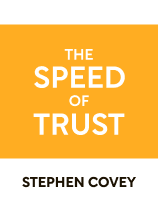

This article is an excerpt from the Shortform book guide to "The Speed of Trust" by Stephen M. R. Covey. Shortform has the world's best summaries and analyses of books you should be reading.
Like this article? Sign up for a free trial here .
Why is trust important in a team? What are the symptoms of low trust in a team? How can you build team trust?
Stephen Covey wrote The Speed of Trust to explain the far-reaching and sometimes subtle impacts of trust in your life. Covey believes society has learned to undervalue trust even though it affects your success in all your relationships, including your career. Fostering team trust in the workplace is one of Covey’s key points.
Read on to find out why trust is important in a team, including how to build team trust, according to Covey.
The Importance of Team Trust
Stephen Covey claims the reason why trust is important in a team relates to how people function in its absence. Groups of people—such as families, school classes, businesses, and so on—function best when trust is high between members. Covey notes that too often, people only think about the importance of team trust when they notice the symptoms of its absence. In his explanation of why trust is important for a team, Covey highlights the following symptoms of low team trust:
Political Tactics. When group trust is low, people often talk behind each other’s backs, compete for status, and question each other’s principles and motivations. Time and energy spent here detract from productivity and group culture.
Rules and Red Tape. In explaining why trust is important for a team, Covey also found that organizations often try to make up for low group trust with extensive rulebooks, elaborate systems of checks and balances, and redundancy in operations. But no amount of rules can make up for a lack of trust. In fact, if you try to replace trust with rules, you can incur trust taxes in efficiency, productivity, and group culture because the constraints stifle creativity and ingenuity and can also make people feel resentful and defensive.
(Shortform note: In The Seven Dysfunctions of a Team, Patrick Lencioni discusses the absence of trust as a foundational element of a dysfunctional team. He notes that when trust is low, people worry more about what others will think of what they say than about sharing their true thoughts and ideas. This leads to a culture of unproductive office politics where people don’t ask for help or offer it to one another. This lack of collaboration hurts productivity and leads to redundancy, which is why trust is important in a team.)
High Turnover. When group trust is low, turnover is often high among employees, investors, and suppliers because people feel less invested in the organization.
(Shortform note: High turnover is not only a symptom of low team trust, but it also contributes to a low-trust atmosphere. We feel more comfortable with people the more we interact with them. Therefore, building enough trust for a team to function at a high level can take time. When turnover in an organization is high, team members may never reach the point in their relationships when they’re performing at their best, which means the organization misses out on trust dividends.)
How to Build Team Trust
Rather than focusing on the symptoms of low trust, Covey suggests that organizations should actively structure themselves to build trust. Now that you understand why trust is important in a team, learn Covey’s suggestions for building team trust.
1. Think about your organization’s symbols and rituals. Every ritual your organization has impacts trust. For example, if your company caters a fancy lunch for management every Friday but does nothing for everyone else, that may be seen as a symbol of disconnection that erodes trust.
(Shortform note: In addition to building trust, symbols can make employees feel more connected to the organization they are part of. A survey of 727 employees of family-run businesses showed that the structure of the organization and the way their managers treated them had a large effect on how connected they felt to the business. These results also suggested that feelings of belonging among employees had a positive impact on business performance.)
2. Revisit and revise your organization’s mission statement using the four building blocks of trust. Then, just as you would for an individual, make sure the organization embodies those values.
(Shortform note: Having a clear collective mission for your organization can make people more engaged in their work. Data suggests that workers who buy into the mission of their organization stay with their company for five or more years and are more likely to be high-performing employees than those for whom a paycheck is their primary motivation.)
3. Bring in people you trust, and trust them. As we have noted, people respond to trust and rise to the occasion. When people feel trusted within a group, they think outside the box, take healthy risks, and celebrate diversity rather than being suspicious of each other.
(Shortform note: There’s a difference between being a trusting manager and a manager who is so hands-off that she isn’t there when her employees need her. In fact, entrusting people with a job and then “abandoning” the project by not following up on progress, not knowing or asking for details, and not asking employees if they need support can lead to trust taxes if people feel unsupported and underappreciated. While every manager will have their own style, consider striking a balance between giving people autonomy and making sure they feel supported and seen.)
4. Be as transparent as possible. As with individuals, transparency within an organization’s structures, norms, and operations builds trust and increases efficiency.
(Shortform note: One way to build trust as a leader is to be transparent about the reasoning behind your decisions. Following Covey’s four building blocks of trust, sharing your reasoning for why trust is important in a team can give people insight into your principles and motives, which can help them trust your decision-making.)

———End of Preview———
Like what you just read? Read the rest of the world's best book summary and analysis of Stephen M. R. Covey's "The Speed of Trust" at Shortform .
Here's what you'll find in our full The Speed of Trust summary :
- Why trust is the ultimate key to success
- A roadmap for building and leveraging trust
- An explanation of Steven Covey's “four cores of credibility”






